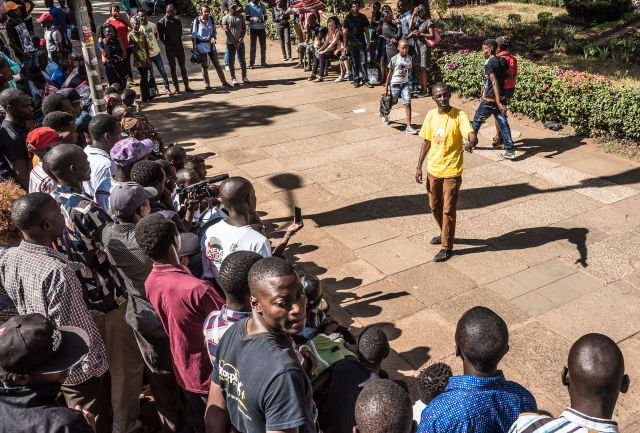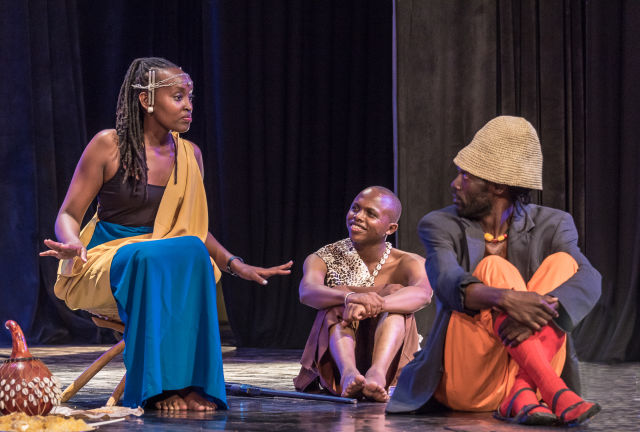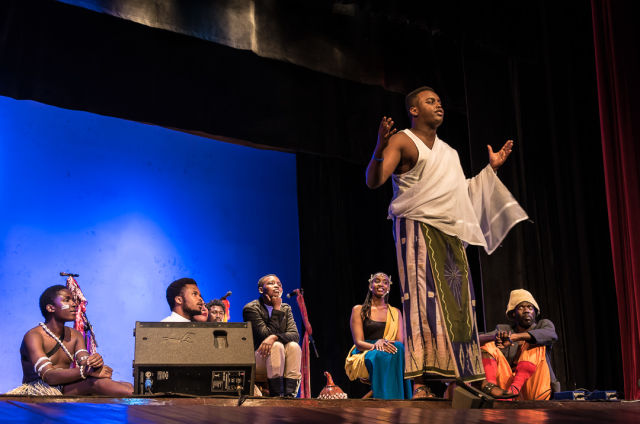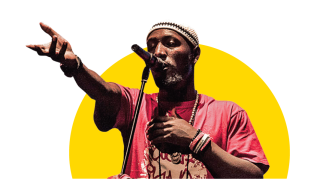THE ONGOING
REVOLUTION
TO UNITE
AFRICAN
LITERATURE
has a radical mission:
an ongoing translation effort
to unite— and elevate—
African literature.

A scene from a performance organized by Jalada—a pan-African writers’ collective—in Nairobi, Kenya.
(Photo: Jerry Riley/Pacific Standard)
It began with a workshop for young writers in Nairobi in 2013, organized by the Kwani Trust and the British Council. As Moses Kilolo recalls, he had never attended a writing workshop before. Like so many of his peers, he had been toiling alone: Each day he would haunt his university library, struggling in his own writing to imitate the English-language classics that he found on the shelves. It was a remarkably well-stocked library, as he remembers it, the best a young writer could hope for. Yet while he had produced a few halting efforts at prose, he hadn’t yet “come out” as a writer. He stayed in the stacks. It was only after the three-day workshop with a dozen other young writers, he says, that the brilliance of his peers pulled him out of the library—helped him to realize what he could never accomplish alone. “I wasn’t as good as I thought,” he laughs. “They tore my work apart! It was moving to know that there’s so much more possibility.”
The feeling was general among the workshop’s participants. At first they stayed in touch out of a spontaneous desire to keep the conversations going. But after Okwiri Oduor—who would win the Caine Prize for African Writing later in the year—set up a Google group named Jalada, after the word for library in Kiswahili, the group began to evolve into something more concrete. As the members began writing, and editing each other’s work, they also began talking about what hadn’t been written yet, and what needed to be. They began building their own library: A few months after the workshop, they set up a bare-bones website (jalada.org) where they published an anthology of original work loosely themed around the notion of insanity, Sketch of a Bald Woman in the Semi-Nude and Other Stories.
It had been an easy choice to publish on the Internet: It was free, it was easy, and they had complete control. As the word spread—and as the inaugural anthology did the rounds on social media—they began hearing from writers across the continent, asking if they could submit to the next anthology. Jalada’s editors said yes. The second collection—Sext Me: Poems and Stories, on the intersections of sex and technology, and twice as long as the first—included a handful of participants from outside Kenya, as well as Jalada’s first official call for submissions. Exactly a year after the first anthology, Afrofuture(s)—a three-part shelf-buster of Africanist speculative fiction—had close to a majority of non-Kenyan writers.

A scene from a performance organized by Jalada—a pan-African writers’ collective—in Nairobi, Kenya.
(Photo: Jerry Riley/Pacific Standard)
As the library has grown from a roomful of young Nairobians to an ongoing conversation that spans the continent—with email, Skype, and social media allowing members in a half-dozen countries to stay in touch—it’s become clear that Jalada is where the future of African literature is being written. A project with a pan-Africanist scope might have drowned under the logistics of communication and distance, or lost its energy in fundraising. Instead, meetings have yielded true mentorships and editorial relationships, and correspondences have blossomed into long-term collaborations, as the contributors to each anthology have become a part of the broader network. The management team remains mostly Kenyan—allowing semi-regular face-to-face meetings—but the structure is as horizontal and outward-looking as possible. Members from Namibia, Nigeria, Zimbabwe, South Africa, and Somalia make up the core group, with an even broader network of contributors and collaborators. Richard Ali in Nigeria and Edwige-Renée DRO in Côte d’Ivoire have been crucial to the project’s expanding reach, for example, both for their editorial expertise and for connecting Jalada to new writers in West and Francophone Africa. Building connections with North Africa is the next hurdle.
Jalada’s “about” page is brief and to the point: a “pan-Africanist writers’ collective” whose goal is “to publish literature by African authors regularly by making it as easy as possible for any member to publish anything.” This tautology—their goal is to publish the things they are publishing—tells a story of its own: Jalada is just the work itself, without money, pretensions, or ego. The anthologies don’t have introductions, nor are there mission statements or manifestos; there is only the writing.
As with anything new and experimental, the quality of the writing is uneven: Sometimes raw and incandescent, it’s as likely to be interestingly incoherent as heart-stoppingly precise. But the collective is bigger than the sum of its parts, and the project’s ambitions are transformative. By self-publishing online—and by working in a spirit of collective collaboration—Jalada’s themes in its first year of existence form a checklist of the topics that someone like Moses Kilolo might struggle to find on the shelves of a Nairobi library: insanity, sex, technology, and the future. Because a top-heavy pantheon of (mostly male) writers from the 1960s and ’70s has dominated African literary publishing for decades, African literature has often been backward-looking and history-oriented. Jalada made a clean break, even establishing a commitment to gender parity from the beginning. (Original contributor Anne Moraa was blasé when I asked her about this: “If you are open to the best work, you will achieve gender parity by default,” she said, though she also gave credit to the original workshop for being gender balanced.)
In 2015, Jalada began its most ambitious project yet: to go beyond the handful of colonial languages in which most African writers write—English, French, Portuguese, and Arabic—and explore the thousands of mother tongues that the vast majority of the continent’s people speak. With more than 3,000 languages spoken by significant populations, Africa’s everyday polylingualism defies most Western understanding. In Kenya, for example, it’s common to speak one language in the streets, another in school, and another in the family home (Swahili, English, and an ethnic or tribal language like Kamba, Kikuyu, or Luo). But exceptions outweigh even this very rough norm; Nairobi urbanites might speak Sheng more than either Swahili or English (the languages of which it is a patois), while interethnic families tend to speak multiple languages. Anywhere you find immigrant communities (which is everywhere), the linguistic cocktail gets mixed in yet other ways.
The only generalization one can venture is this: If there’s one thing that unites Africa—that nearly all Africans have in common—it’s the same polylingualism that divides it, an irony that has haunted African literature since its beginnings. It has taken a project like Jalada to do something about it.
Before colonization and the imposition of European languages, the continent’s poetics were oral, dispersed across Ewe, Shona, Kiswahili, Luganda, Igbo, and thousands of other languages. When African literature began to be written, published, and read in the early part of the 20th century, it was in the context of imperialist globalization, a Pan-Africanism that was invariably expressed in the languages of the colonizers. Indeed, English, French, Portuguese, and Arabic provided the literary infrastructure that brought writers and readers across Africa into contact with each other, sometimes for the first time in history: Nigerians could read Kenyans in English, Ivorians could read Mauritanians in French, and novels by Tayeb Salih of Sudan (in Arabic) or Pepetela of Angola (Portuguese) could crisscross the continent in translation. But that was where it usually stopped; translations from African languages were rare (and mostly ethnographic), while translations between African languages were almost non-existent.
For most African writers, then and now, the languages of the former colonizers have been the only pragmatic choice. Faced with a nation speaking over 300 languages, for example, Chinua Achebe wrote in English, the only language most Nigerians shared. Rare exceptions prove the rule: When Ngugi wa Thiong’o vowed to write only in his native Gikuyu, in the 1970s, his polemic made waves but few converts. His manifesto, Decolonizing the Mind, has been debated and fought over for decades and remains a lightning rod for controversy in African literary circles. But the cruel irony is that most still read him in English. Without a strong Gikuyu publishing industry—in a country where Gikuyu speakers make up around 20 percent of the population—even Ngugi’s main Kenyan audience will always read him in English translation.
In 2015, Jalada published an anthology of original stories and poems both in the authors’ own respective languages (many of which were African) and in a variety of translations. Kilolo’s “An Empty Wall,” for example, is presented both in English and in Junior Moyo’s Ndebele translation (a language spoken in Zimbabwe). Edwige-Renée DRO wrote “Pneu Secours” in French and translated it into English herself, while Mazhun Idris made the translation into Hausa (spoken in northern Nigeria). But this was just a prelude to the group’s most striking translation project: In the next anthology, they took a story donated by Ngugi wa Thiong’o (“Ituika Ria Murungaru” in Kikuyu, “The Upright Revolution” in English) and translated it into 62 languages (and counting).

A scene from a performance organized by Jalada—a pan-African writers’ collective—in Nairobi, Kenya.
(Photo: Jerry Riley/Pacific Standard)
While the accomplishment is remarkable, of course, the anthology can’t really be read in the conventional manner at all: Few can read Ngugi’s folkloric parable about why humans walk upright in more than a handful of the languages that the anthology offers. Rather, the point is to imagine a different kind of library. “At a personal level, what Jalada has done is akin to recapturing stolen lands,” as founding editor Richard Oduor Oduku told me. “We have recaptured the authority to imagine our own futures, including what languages we will, or we can, employ.” This sentiment was general among the translators I spoke with; Rwandan Louise Umutoni, for example, described translation into European languages as a kind of brain drain, and explained that, instead of Africa’s literary resources enriching languages like English, Jalada reversed the flow, translating European works into African languages starved for the written literary word.
In November, Jalada staged a reading of the story in Nairobi, in seven languages: Sheng, Kiswahili, Dholuo, Kikuyu, Kiluhya, Kinyarwanda, and English. Few in the audience would have been fluent in more than a few of them. But, as Kilolo recalled, the revelation was seeing seven different languages in the same place, before the same audience, uniting rather than dividing. “People were thrilled to see so many languages at once,” he said. “We have to do away with the notion that speaking a different language divides people.”
>via: https://psmag.com/magazine/the-revolution-uniting-african-literature


